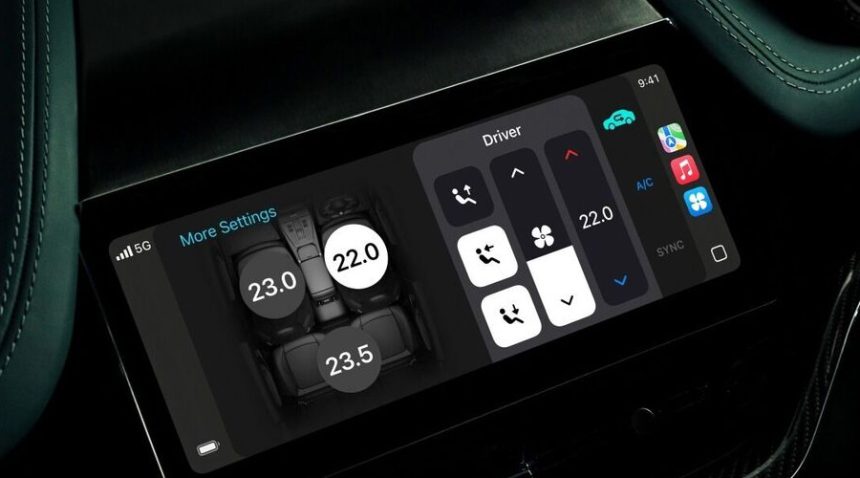Instead of relying on Apple, many manufacturers are focusing on developing or enhancing their in-house software
Several top carmakers, including Mercedes-Benz, Audi, and Volvo, have decided not to adopt Apple’s next-generation CarPlay Ultra system in their upcoming models. This marks a significant moment in the growing tug-of-war between traditional automakers and big tech companies over control of the in-car digital experience. The decision reveals deeper concerns among auto manufacturers about data privacy, brand control, and long-term revenue from software services.
Control Over the Digital Experience
One of the biggest reasons behind the rejection of Apple CarPlay Ultra is that it gives too much control to Apple over the car’s digital dashboard. Car companies like Mercedes-Benz and Audi have invested millions into developing their infotainment systems. These systems are an important part of how the car feels to customers and are deeply tied to the brand’s identity.
With CarPlay Ultra, Apple wants to take over multiple screens in the car, not just the central display, but also the instrument cluster and even passenger screens. Automakers believe this would make their vehicles feel more like Apple products and less like their own. By controlling what the driver sees and interacts with, Apple would be taking over a large part of the customer experience, something many automakers are unwilling to allow.
Concerns Over Data and Privacy
Modern cars collect a lot of data. This includes driving behavior, navigation habits, climate control preferences, and even the way a driver uses the seat or radio. This information is valuable, both for improving vehicle features and for developing new services such as subscriptions or predictive maintenance.
Apple’s CarPlay Ultra would have deep access to these systems, which could potentially give the company access to sensitive data. Automakers are concerned that handing this information to Apple would reduce their ability to use it for their services. Keeping control over vehicle data is seen as essential for building new revenue models in a world where car sales alone are no longer enough to grow profits.
Automakers Building Their Software Ecosystems
Instead of relying on Apple, many manufacturers are focusing on developing or enhancing their in-house software. For example, Volvo and Polestar use Google’s Android Automotive system, which is deeply integrated into the car but still gives the automaker control over the interface and data. Mercedes and BMW are building their platforms as well, while Renault is working with Google and Qualcomm to offer a custom in-car experience.
By doing this, these companies ensure that they own the relationship with the customer and can build unique features that make their cars stand out. This also allows them to offer software updates, sell new features through subscriptions, and maintain a consistent brand experience across all their models.
Limits of Apple’s Approach
Apple designed CarPlay Ultra to be more advanced than the current version of CarPlay. It is meant to handle more than just music, calls, and navigation. It aims to control speedometers, fuel levels, climate control, and more—all displayed through Apple’s design and layout. While this would offer users a familiar and sleek interface, it also means Apple would have full control over how information is shown in the car.
European carmakers see this as Apple overstepping its role. Instead of supporting the automaker’s existing systems, CarPlay Ultra would replace them. This goes against the interest of companies that have spent years developing their user interfaces and experiences. Some executives have even commented that tech companies should focus on building great apps and services rather than trying to take over the entire in-car system.
Support Continues for Standard CarPlay
It’s important to note that these automakers are not rejecting Apple entirely. The traditional version of CarPlay, which mirrors the iPhone’s interface on the car’s central display, will still be available in most new vehicles. Drivers will still be able to use Apple Maps, make calls, listen to music, and use Siri through this version. It’s only the deeper integration of CarPlay Ultra that’s being declined for now.
This balanced approach allows automakers to meet customer demand for smartphone connectivity while still keeping control over the car’s core systems.
Other Automakers Still Considering CarPlay Ultra
Not all carmakers have turned away from Apple’s new system. Some companies, including Hyundai, Kia, Genesis, Porsche, and Aston Martin, have confirmed plans to support CarPlay Ultra in their future models. Other big names like Ford, Nissan, and Jaguar Land Rover are still evaluating the system and have not made a final decision.
Apple believes that over time, more brands will join as customers begin to expect a more unified and user-friendly in-car experience. The company has promised that CarPlay Ultra will still allow some customization to match the car brand’s style, but it remains to be seen whether that will be enough to win over the larger automakers.
The Fight for the Digital Dashboard
The dispute between Apple and automakers reflects a bigger shift happening in the car industry. As cars become more connected and electric, the software inside the vehicle is becoming just as important as the hardware. The digital dashboard is now a key space where companies want to express their brand, collect data, and deliver new services.
By rejecting CarPlay Ultra, brands like Mercedes, Audi, and Volvo are making it clear that they want to be the ones in charge of that space. This also signals that future competition in the car industry will not only be about horsepower and design, but also about user interface, digital services, and data ownership.
A Future of Multiple Choices
In the coming years, the automotive world is likely to split into several different approaches. Some brands will fully embrace partnerships with tech giants like Apple and Google, allowing them to handle the digital experience. Others will build their platforms or mix outside technology with in-house solutions. Either way, the dashboard will become a central battleground for customer attention and brand loyalty.





